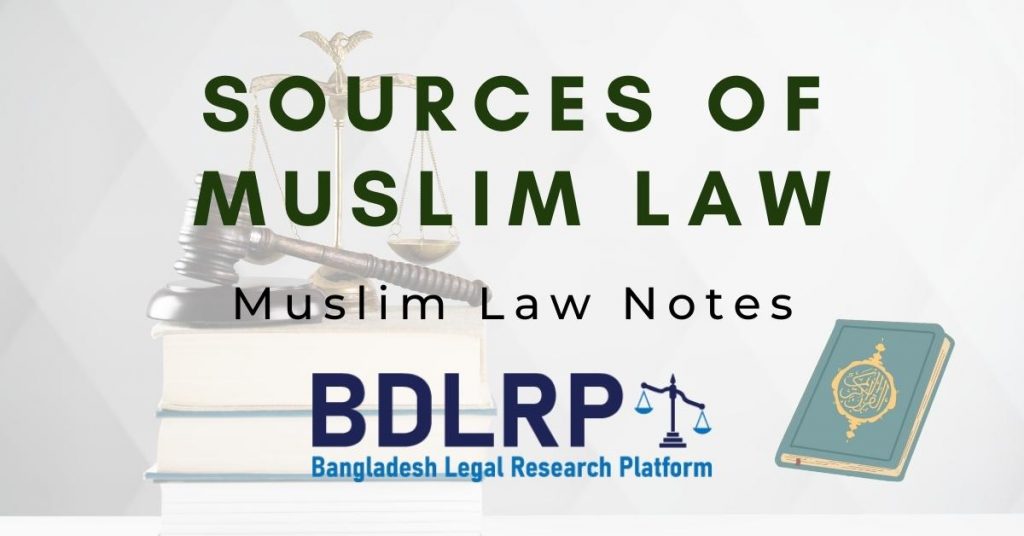Islamic law consists of moral, ethical and social code. The sources of Islamic law are –
1. Devine law
2. Non-Devine law
The Devine sources are – a. Quran b. Sunna/Hadith
Non-Devine sources are – a. Ijma b. Qiyas c. Ijtihad; Some jurists also recognize Istihsan, Istidlal and Istislah as sources of Islamic law. It is also called subsidiary sources of law.
1.The Quran:
Al-Quran is the first and main source of Islamic law. Literally, Quran means ‘reading ‘ or ‘recitation ‘.It was revealed piecemeal over a period of 23 years – 13 years at Mecca, and 10 years at Medina, in relation to particular events or necessity. There are 114 Suras (Chapter) and 6666 verses (Sentences) divided into 30 equal parts (para), each chapter having separate little. The revelation of the Quran began with Sura Al-Alaq (96:1) starting with the word— “Read in the name of your lord” Ending with the verse in sura Al-Mayidah (5:3)— “Today I have perfected your religion for you and completed my favour torward you, and chosen Islam as your religion”.
Classification of the verses of the Quran: The Suras or verses are of two types- a. Makki b. Madani
a. Makki sura: All the suras which revealed from the starting upto Hijrat are called Makki sura. The subject-matter of these suras is-oneness of Allah, prophethood and the next world. The length of the suras is small. The number of Makki sura is ninety two (92).
b. Madani sura: All these suras which were revealed after Hijrat and upto the last verse are called Madani sura. The subject -matter of these sura are:- individual as well as collective ibadat, social and economic affairs, inheritance, war, treaty, trade and commerce, legislation and mode of implementation etc. The number of Madani sura is twenty two (22).
2. Sunnah or Hadith:
Sunnah or Hadith is the second source of Islamic law.
Question: What is difference between Sunnah and Hadith?
Sunnah: Sunnah means the words, the acts and the acquiescence of the prophet Mohammad (peace be on him) and the words and acts of his companions. Literally speaking, Sunnah means a path or a way, a manner of life.
Hadith: Hadith means all that is narrated from the prophet, his doings, his sayings, his tacitly, approved activities. Hadith means the words of the prophet only. Literally, it means ‘news’ or ‘tale’ or verbal communication of any kind.
Arguments in favour of Hadith or Sunnah: The flowing verses of the suras support the authority of Hadith as source of Islamic law:
- “He (prophet) does not speak of his one desire, it is none other revelation.” (53:3)
- “Obey Allah and obey the apostle and those in authority from among you.” (4:59)
- “Whoever obeys the apostle, he indeed obeys Allah.” (4:80)
- “I follow not but what is revealed to me.” (10:15)
- “And most surely you conform to sublime morality.” 68:4)
- “Say, surely (as for) me, my Lord has guided me to the right path.” (6:161)
Classification of Hadith: According to jurists, there are three types of Hadith. These are – a. The Mutawatir b. The Mashoor c. The Ahad
a. Mutawatir: Literally, Mutawatir means ‘continuously recurrent’. In the context of law, it means a report by an indefinite number of people related in such a way as to preclude the possibility of their agreement to perpetuate lie. Such a possibility is inconceivable due to their large number, diversity of residence and reliability.
b. Mashoor: This type of Hadith is originally reported by one, two or more companions from prophet or from another companions but later become well known and was transmitted by an indefinite number of people.
c. Ahad: Ahad Hadith is that Hadith which is isolated and it is reported by one narrator from another or by one from many narrators or by many from one narrator. This Hadith fails to fulfill the requirements of either the Mutawatir or Mashur Hadith.
3. Ijma:
Ijma is considered as the third source of Islamic law. It has two meaning — (1) to determine and to agree upon something; (2) whenever there is a unanimous agreement on something, there is also a decision on that matter.
Sir Abdur Rahim defines Ijma as the agreement of the jurists among the followers of the prophet Mohammad (peace be on him)in a particular age on a question of law.
Authority in favour of Ijma: The following verses of the holy Quran are cited in favour of Ijma:
- “you are the best community that has been raised for mankind. You injoin right and forbid evil”.(3:110)
- ” Do not be like those who separated and divided after they had received clear proofs”.(3:105)
- “Today I have completed your religion”.(5:3)
- ” If you yourselves do not know, then ask those who know “.(21:7)
- ” Cling firmly together to the rope of Allah and do not be separated”.(1:103)
Hadith in favour of Ijma:
- My followers will never agree upon what is wrong.
- Whoever separate himself from the main body will go to hell.
- Whatever the Muslims hold to be good in the eye of Allah. d. It is incumbent upon you to follow the most numerous body.
Types of Ijma: According to the status of jurists, it is of three types –
- Ijma of the companions of the prophet.
- Ijma of the Mujtahidan
- Ijma of the Mujtahidan but not necessarily of the Mujtahid only.
4. Qiyas or Analogy:
Qiyas is the fourth source of Islami law. It literally means ‘measuring’. In the language of law, it means a Process of deduction by which the law of a text is applied to cases which are governed by the reason of the text.
Arguments in favour of Qiyas: We can give some arguments in its favour to remove controversy. These are –
a. It is reality that in the ever -changing world new problems warrant solution if these cannot be solved by any direct text of the holy Quran or Hadith and not determined by Ijma. Under the circumstances, Mujtahidan provide proper solution by applying analogy or Qiyas in the light of Quran and Hadith.
b. The punishment for drinking wine, for example, is scourging of eight strifes determined by a Hadith. But what would be the punishment for addiction of heroine. By applying analogy the Mujtahid can prescribe the same punishment or more for such addiction as it has been fixed for addiction to drinking wine.
c. A well -known Hadith narrated by Ibn Abbas is a strong ground in favour of Qiyas. The holy prophet appointed Muadh-bin Jabal, one of his companions, as Governor of Yemen amd also as judge. No trained lawyers existed at that time and the prophet asked him. ‘According to what shall you judge? He replied : ‘According to the holy Quran. ‘And if you find not therein?’ ‘According to the Sunnah’. ‘And if you find not therein?’ ‘Then I shall strive to interpret with my reason’. At this prophet was pleased and said: Praise be to Allah who has favored His messenger with what his messenger is willing to approve.
Arguments against Qiyas: Though Qiyas is considered by majority jurists as the fourth source of Islamic law, but still Zahiri School and some persons belonging to Mutazila school specially Ibrahim-al Nazzam and Ibn Hazm deny the authority of Qiyas as valid source of Islamic law. They have placed the following arguments against Qiyas.
a. They contended that commands and prohibitions are determined the clear authority of the Quran, the Hadith or Ijma and in their absence nothing else can determine and obligatory or a prohibitory injunction, and the matter would automatically fall under the category of mubah.
b. Ibn Hazm placed another argument against Qiyas quoting from the Quran which is,- “This day, I have perfected your religion for you, and completed my favour upon you”(5:3).
c. ” O you who believe, do not press for word before Allah and His messenger and fear Allah”.
5. Subsidiary sources:
It is three types, these are- a. Istihsan b. Istislah c. Istidlal
a. Istihsan or Juristic Equity: The term ‘Istihsan’ was used by the Hanafi lawyers alone. Literally, Istihsan means ‘preferring’ or considering a thing to be good. According to Hanafi school, rule deduced by Istihsan is based on the Holy Quran and Sunnah and like a rule of Qiyas. Istihsan is based on the consideration that a law is enacted for the benefit and good of man. Example: If a wife falls sick in the house of her husband, she is entitled to maintenance as per the principle of Istihsan.
b. Istislah or public good: Maliki school introduced ‘Istislah’. According to the doctrine, deduction of law can be based on the ground that it is in the interest of the community or ‘public good’. Example: A fortress is besieged by a Muslim army. The besieged use Muslim prisoners as a shield. It is not allowed to shoot at the Muslim prisoners because occupation of the fortress is not absolutely essential to save Islam or the Muslim community.
c. Istidlal: ‘Istidlal’, according to the Hanafi school, means inferring of a thing from another thing. But according to Maliki and Shafi school, it is a distinct method of juristic deduction on the basis of legal reasoning, but not covered by Qiyas. Example: sexual intercourse between two unmarried persons is not valid, so it is forbidden.
6. Ijtihad:
The word ‘Ijtihad’ an Arabic term, originates from ‘Zahad’ which literally means ‘striving’, ‘exerting’ etc. “Ijtihad is the capacity for making deductions matters of law in cases to which no express text or a rule already determined by Ijma.
Author: Md. Nazim Uddin
Department of Law and Land Administration,
Patuakhali Science and Technology University (PSTU).





Comments are closed.